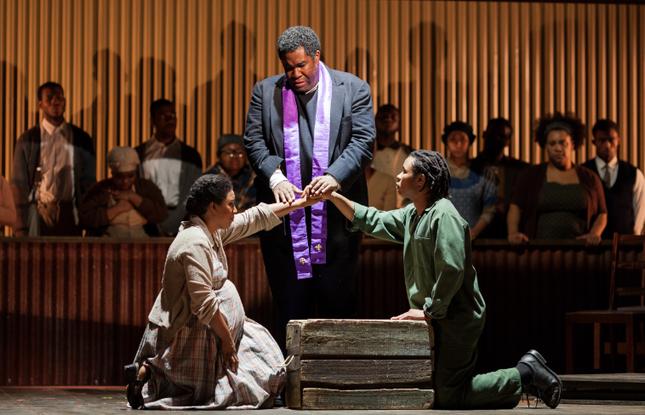WNO’s ‘Lost in the Stars’: Potent Tragedy, Music With a Heart and Conscience
By • February 22, 2016 0 1662

It’s tempting to define the Washington National Opera production of Kurt Weill’s stoically hopeful work “Lost in the Stars” by what it isn’t, not by what it is, by what it doesn’t do instead of what it, in the end, so powerfully accomplishes.
Let’s begin by saying that while it may be in the season slate of the WNO, it is not strictly or even loosely speaking an opera, although it has its operatic moments. It is not “Carmen,” nor is it, God knows, connected in any way to the “The Ring Cycle,” two canonical works of opera with a capital “O” — and part of a season that also included the not-so-easy-to-categorize “Appomattox”.
Nor is it a musical disguised as an opera, the mane of confusion that sometimes is associated with “Porgy and Bess” and “Showboat.” If the need to categorize exists, and Lord knows these days it does just so people can check to see if they’re sitting in their comfort zone seats, then let’s call “Lost in the Stars,” a play with more music than usual.
It is also a political play fueled by a large dose of imagination and empathy as well as a heart and a conscience.
The last work by Weill, who’s usually associated with the more rowdy, anti-capitalist works with collaborator Bertold Brecht (“Three-Penny Opera” and “Happy End”), but who in this case attached himself to a project that displayed the human tragedy of the solidified apartheid policy of South Africa as it affected both the white power holders and the afflicted blacks.
The music — some of it transferred deftly and effectively from other projects — is Weill’s, empathic, soaring, powerful and searing, a varied score of genres that speaks with different voices to the fate of its characters. The book is by Maxwell Anderson, a playwright whose works are not much performed any more, but who was much in vogue during the 1930s and 1940s for his poetic sensibility (Someone should resurrect his “Winterset.”)
“Lost in the Stars” sneaks up on you like a persistent whisper. It has its irritating moments of familiarity and expectations denied and is sometimes stingy with its music, pursuing narrative with long stretched of spoken dialogue.
by the white — and anti-apartheid — South African author Alan Paton, “Lost in the Stars” concerns Stephen Kumalo, a black village pastor who goes to Johannesburg to find his son, the not too subtly named Absalom, who, it turns out, is on trial for the murder of a white man. Absalom admits the killing — “I will not lie any more” — which occurred during the course of a robbery with two other men. He is convicted and sentenced to hang. Kumalo — performed, acted, and sung with stirring power by star bass baritone Eric Owens (“The Flying Dutchman” at WNO) — tries to plead for the life of his son to the murdered man, a staunch Afrikaaner, to no avail.
Yet — amid staged crowd scenes at a rail station, in court and in the village which accentuate and dramatically and musically illustrated the separation of the races — the production builds brick by emotional brick, operatically at times, dramatically at others, and most effectively, quietly. There are showy, show-stopper songs to be sure — none more than Owens’s rendition of the title song, which makes the plight of the characters universal. There are the sweetly and emotionally powerful songs sung by soprano Lauren Michelle as Absalom’s bereft girlfriend Irina, like “Trouble Man” and “Stay Well,” “The Hill of Ixopo,” led by Sean Pannikar and an affecting chorus, the scene-stealing “Big Mole,” performed with high spirits by young Caleb McLaughlin.
The long narrative or exposition sections of “Lost in the Stars” can sometimes make an audience restless. But director Tazewell Thompson — who is well remembered here for his stint at Arena Stage as well as more recent work with the WNO — steers the production with both hands on the wheel deftly toward an ending that seems to demand silence. It may seem an ending which is more hopeful than helpless in its result: The fathers both realize the monumental losses they have suffered as fathers but also as human beings and join together as part of one community. It’s the kind of result that in today’s inflammatory political atmosphere seems to inspire sneers and snark, but also has a historical context.
People like Paton risked much in making public art — novels, in his case — that exposed the injustices of apartheid. As a white artist, he was not alone—he paved the way for the universally successful plays of Athol Fugard (“The Road to Mecca,” “The Blood Knot” and “Master Harold and the Boys”) which also stood in stark opposition to apartheid).
It is easy to be a little dismissive of a work that defies genre and is not easily digested and aspires to an embrace of hopefulness as a noble failure. I think if you go—and you should—you might find that your fellow audience members think a little more of it than that.
“Lost in the Stars” can be seen at the Kennedy Center’s Eisenhower Theater Feb. 17, 18, 19 as well as Feb. 20, which includes a matinee performance.

